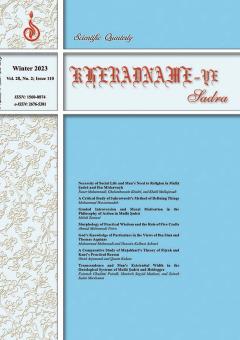Necessity of Social Life and Man’s Need to Religion in Mullā Ṣadrā and Ibn Miskawayh
Subject Areas : Studies on Mulla Sadra and the Transcendent PhilosophyNaser Mohamadi 1 , Gholamhossen Khedri 2 , Khalil Mollajavadi 3
1 - Professor at Islamic Philosophy and Kalam Department, Payam-e Noor University, Tehran, Iran
2 - Associate Professor, philosophy of Kalam and Ethics Department, Payam-e Noor University, Tehran, Iran
3 - PhD candidate of Philosophy of Religion, Payam-e Noor University, Tehran, Iran
Keywords: social life, Man’s need for religion, Shar‘, law, Love, intrinsic need, Prophet, perfect Man, Mullā Ṣadrā, Ibn Miskawayh,
Abstract :
The present paper investigates the necessity of the development of social life in the view of Mullā Ṣadrā and Ibn Miskawayh in the domain of religion’s response to human needs following a comparative approach. Mullā Ṣadrā believes that the necessity of fulfilling human needs warrants the existence of law and Shar‘ as well as an individual as a prophet. Following a philosophical approach, he explains that the concept of human species is realized in their “collective identity” outside their mind and in their social schematism. Ibn Miskawayh’s standpoint, which is worth more deliberation and is perhaps unique, indicates that man’s main need for collective life is due to the necessity of responding to their intrinsic need for mutual “love and affection”, while he refers to satisfying material needs at a later level. In his view, love provides the basis for life and formation of human collective society. Mullā Ṣadrā’s view enjoys a rational and philosophical essence, whereas Ibn Miskawayh’s explanation is merely based on the presence of love and affection among human beings. However, both thinkers acknowledge that the revealed religious theorems can respond to all human worldly and other-worldly needs. Nevertheless, none of them directly and clearly emphasizes the necessity of the purification of the soul for the prophet and the divine perfect Man.
ابنسینا (1404ق) شفاء، الاهیات (1)، تصحیح و تحقیق ابراهیم مدکور، قم: كتابخانه آيتالله مرعشی نجفی.
ابنمسکویه (1410ق) تهذیب الاخلاق و تطهیر الاعراق، تصحیح و تحقیق حسن تمیم، قم: بیدار.
امین، سیدحسن (1351) برداشتی از مشاعر ملاصدرا، تهران: فراهانی.
امین، سیدحسن (1400) وحدت وجود در فلسفه و عرفان اسلامی، تهران: بعثت.
حسنزاده آملی، حسن (1378) ممدالهمم فی شرح فصوص الحکم، تهران: وزارت فرهنگ و ارشاد اسلامی.
حسنزاده آملی، حسن (بیتا) گشتی درحرکت، تهران: مرکز فرهنگی رجا.
حلی، علامه یوسف ابن مطهر (1398) کشفالمراد فی شرح تجرید الاعتقاد، تصحیح و تحقیق میرزاابوالحسن شعرانی، تهران: کتابفروشی اسلامیه.
سهروردی (1380الف) مجموعه مصنفات شیخاشراق، ج4، تصحیح و تحقیق نجفقلی حبیبی، تهران: پژوهشگاه علوم انسانی و مطالعات فرهنگی.
سهروردی (1380ب) مجموعه مصنفات شیخاشراق، ج3، تصحیح و تحقیق سيدحسین نصر، تهران: پژوهشگاه علوم انسانی و مطالعات فرهنگی.
شکیبی، زینب؛ علم الهدی، سیدعلی؛ پیکانی، جلال (1399) کلیات فلسفه، تهران: دانشگاه پیام نور.
شیروانی، حاج زینالعابدین (بیتا) بستان السیاحه، تهران: کتابخانه سنایی.
طباطبایی، سید محمدحسین (1378) المیزان فی تفسیر القرآن، ج20، تهران: دارالکتب الاسلامیه.
طباطبایی، سید محمدحسین (بیتا) اصول فلسفه و روش رئالیسم، ج2، مقدمه و پاورقی مرتضی مطهری، تهران: صدرا.
قاضی، سید محمدحسن (1385) آیت الحق، ترجمه سيدمحمدعلي قاضينيا، تهران: بصیرت/ حکمت.
قمی، قاضی سعید (1362) کلید بهشت، تصحیح سیدمحمد مشکوه، تهران: الزهرا.
گرامی، محمد علی (1373) فلسفه، قم: دفتر تبلیغات اسلامی.
ملاصدرا (1378) المظاهر الإلهیة فی أسرار العلوم الکمالیة، تصحیح و تحقيق و مقدمۀ آیتالله سیدمحمد خامنهای، تهران: بنیاد حکمت اسلامي صدرا.
ملاصدرا (1382) الشواهد الربوبیة فی المناهج السلوکیة، تصحیح و تحقيق سيدمصطفی محققداماد، تهران: بنیاد حکمت اسلامي صدرا.
واخ، یوآخیم (1391) جامعهشناسی دین، ترجمه جمشید آزادگان، تهران: سمت.


